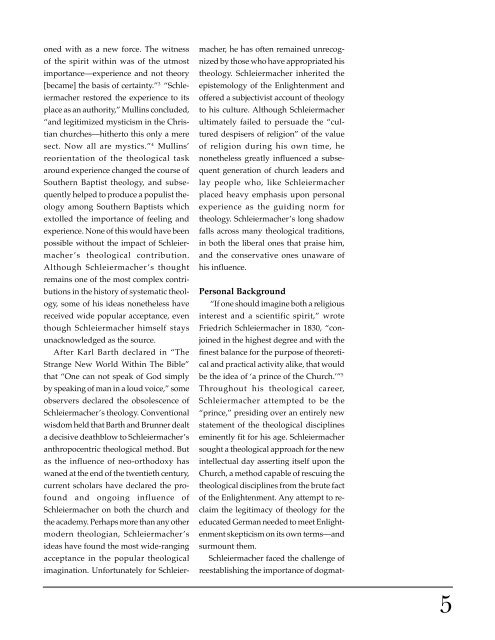4 A Revelation of the Inward: Schleiermacher's Theology and the ...
4 A Revelation of the Inward: Schleiermacher's Theology and the ...
4 A Revelation of the Inward: Schleiermacher's Theology and the ...
You also want an ePaper? Increase the reach of your titles
YUMPU automatically turns print PDFs into web optimized ePapers that Google loves.
oned with as a new force. The witness<br />
<strong>of</strong> <strong>the</strong> spirit within was <strong>of</strong> <strong>the</strong> utmost<br />
importance—experience <strong>and</strong> not <strong>the</strong>ory<br />
[became] <strong>the</strong> basis <strong>of</strong> certainty.” 3 “Schleiermacher<br />
restored <strong>the</strong> experience to its<br />
place as an authority,” Mullins concluded,<br />
“<strong>and</strong> legitimized mysticism in <strong>the</strong> Christian<br />
churches—hi<strong>the</strong>rto this only a mere<br />
sect. Now all are mystics.” 4 Mullins’<br />
reorientation <strong>of</strong> <strong>the</strong> <strong>the</strong>ological task<br />
around experience changed <strong>the</strong> course <strong>of</strong><br />
Sou<strong>the</strong>rn Baptist <strong>the</strong>ology, <strong>and</strong> subsequently<br />
helped to produce a populist <strong>the</strong>ology<br />
among Sou<strong>the</strong>rn Baptists which<br />
extolled <strong>the</strong> importance <strong>of</strong> feeling <strong>and</strong><br />
experience. None <strong>of</strong> this would have been<br />
possible without <strong>the</strong> impact <strong>of</strong> Schleiermacher’s<br />
<strong>the</strong>ological contribution.<br />
Although Schleiermacher’s thought<br />
remains one <strong>of</strong> <strong>the</strong> most complex contributions<br />
in <strong>the</strong> history <strong>of</strong> systematic <strong>the</strong>ology,<br />
some <strong>of</strong> his ideas none<strong>the</strong>less have<br />
received wide popular acceptance, even<br />
though Schleiermacher himself stays<br />
unacknowledged as <strong>the</strong> source.<br />
After Karl Barth declared in “The<br />
Strange New World Within The Bible”<br />
that “One can not speak <strong>of</strong> God simply<br />
by speaking <strong>of</strong> man in a loud voice,” some<br />
observers declared <strong>the</strong> obsolescence <strong>of</strong><br />
Schleiermacher’s <strong>the</strong>ology. Conventional<br />
wisdom held that Barth <strong>and</strong> Brunner dealt<br />
a decisive deathblow to Schleiermacher’s<br />
anthropocentric <strong>the</strong>ological method. But<br />
as <strong>the</strong> influence <strong>of</strong> neo-orthodoxy has<br />
waned at <strong>the</strong> end <strong>of</strong> <strong>the</strong> twentieth century,<br />
current scholars have declared <strong>the</strong> pr<strong>of</strong>ound<br />
<strong>and</strong> ongoing influence <strong>of</strong><br />
Schleiermacher on both <strong>the</strong> church <strong>and</strong><br />
<strong>the</strong> academy. Perhaps more than any o<strong>the</strong>r<br />
modern <strong>the</strong>ologian, Schleiermacher’s<br />
ideas have found <strong>the</strong> most wide-ranging<br />
acceptance in <strong>the</strong> popular <strong>the</strong>ological<br />
imagination. Unfortunately for Schleiermacher,<br />
he has <strong>of</strong>ten remained unrecognized<br />
by those who have appropriated his<br />
<strong>the</strong>ology. Schleiermacher inherited <strong>the</strong><br />
epistemology <strong>of</strong> <strong>the</strong> Enlightenment <strong>and</strong><br />
<strong>of</strong>fered a subjectivist account <strong>of</strong> <strong>the</strong>ology<br />
to his culture. Although Schleiermacher<br />
ultimately failed to persuade <strong>the</strong> “cultured<br />
despisers <strong>of</strong> religion” <strong>of</strong> <strong>the</strong> value<br />
<strong>of</strong> religion during his own time, he<br />
none<strong>the</strong>less greatly influenced a subsequent<br />
generation <strong>of</strong> church leaders <strong>and</strong><br />
lay people who, like Schleiermacher<br />
placed heavy emphasis upon personal<br />
experience as <strong>the</strong> guiding norm for<br />
<strong>the</strong>ology. Schleiermacher’s long shadow<br />
falls across many <strong>the</strong>ological traditions,<br />
in both <strong>the</strong> liberal ones that praise him,<br />
<strong>and</strong> <strong>the</strong> conservative ones unaware <strong>of</strong><br />
his influence.<br />
Personal Background<br />
“If one should imagine both a religious<br />
interest <strong>and</strong> a scientific spirit,” wrote<br />
Friedrich Schleiermacher in 1830, “conjoined<br />
in <strong>the</strong> highest degree <strong>and</strong> with <strong>the</strong><br />
finest balance for <strong>the</strong> purpose <strong>of</strong> <strong>the</strong>oretical<br />
<strong>and</strong> practical activity alike, that would<br />
be <strong>the</strong> idea <strong>of</strong> ‘a prince <strong>of</strong> <strong>the</strong> Church.’” 5<br />
Throughout his <strong>the</strong>ological career,<br />
Schleiermacher attempted to be <strong>the</strong><br />
“prince,” presiding over an entirely new<br />
statement <strong>of</strong> <strong>the</strong> <strong>the</strong>ological disciplines<br />
eminently fit for his age. Schleiermacher<br />
sought a <strong>the</strong>ological approach for <strong>the</strong> new<br />
intellectual day asserting itself upon <strong>the</strong><br />
Church, a method capable <strong>of</strong> rescuing <strong>the</strong><br />
<strong>the</strong>ological disciplines from <strong>the</strong> brute fact<br />
<strong>of</strong> <strong>the</strong> Enlightenment. Any attempt to reclaim<br />
<strong>the</strong> legitimacy <strong>of</strong> <strong>the</strong>ology for <strong>the</strong><br />
educated German needed to meet Enlightenment<br />
skepticism on its own terms—<strong>and</strong><br />
surmount <strong>the</strong>m.<br />
Schleiermacher faced <strong>the</strong> challenge <strong>of</strong><br />
reestablishing <strong>the</strong> importance <strong>of</strong> dogmat-<br />
5

















